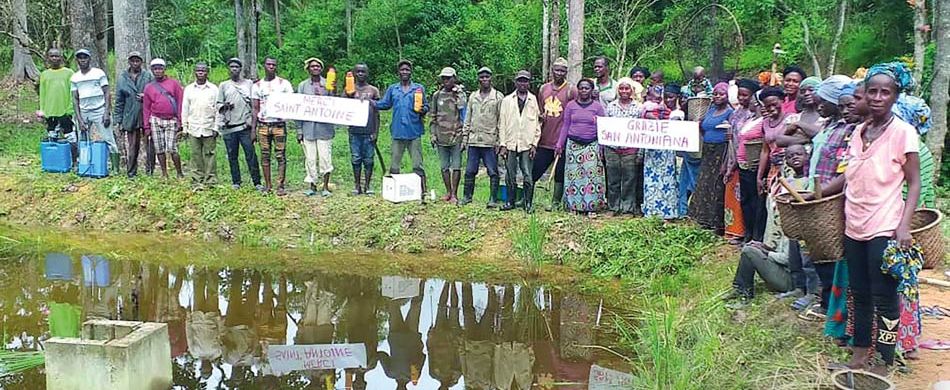The Paddy Field
ONE meal a day is the general rule in Guinea. Only the lucky eat more. Before going to sleep, many are already thinking about what they can eat the following day. Even though around 80 per cent of the population are farmers and they grow a lot of rice, the staple food of the population, the harvest isn’t sufficient even to feed the Guineans. Additional rice has to be imported from Asia, and those who have no money, cannot buy.
Empty bellies
Sènèbou, a village on the outskirts of Macenta, the capital of the Macenta Prefecture in the southeast of Guinea, has a population of around 200. “It rains a lot in this region – almost seven months a year,” says Sister Jeanne Pascale Guilavogui, “and this prevents adequate cultivation for food needs.”
“There’s a saying that ‘a hungry man is not a free man’, and this is true of our area: people are not free because they are always hungry through lack of food,” she continues. “One meal a day is not at all safe today. Children can’t go to far away schools with empty stomachs, for example. And parents are unable to feed their children and families, nor are they able to take care of themselves.”
Good results
Previously, the village created a paddy field using water tanks. This had good results: less work, fewer costs, and a larger quantity of rice than when grown using traditional farming techniques. But there were also problems associated with that project: the village had to buy expensive seeds and pay the technicians to use fertilisers and pesticides.
So the nuns of the Congregation of the Servants of Mary Virgin and Mother, founded in 1984 by Monsignor Philippe Kourouma, devised a project with the aim of improving nutrition. This would be achieved through better cultivation of the land, requiring less time and producing a better yield through team work and using a rice variety called Nercia. “This new production will help us have a much more abundant production with less effort and time,” says Sr. Jeanne. “We will also be able to cultivate rice several times each year.”
As part of the project, six young people specialised in agricultural methods would be hired. Then 30 young men, and 30 young women from the village would be chosen to be trained by them on how to work in the new paddy field. “The men will first clear the trees and grass and make new tanks which should then last for around five years before needing to be renewed,” explains Sr. Jeanne. “The women will plant the seeds, collect the rice, dry it, and put it in sacks after it has been cleaned by the men using a machine.” The division of labour between the men and women will allow each to do their other daily tasks. “The farmers are used to working in several places at a time,” she says. “So, while they are cultivating rice, they also make palm oil, plant peanuts, or clean their coffee fields.”
US generosity
The sum requested from St. Anthony’s Charities was €9,000. This was approved and was funded by a donation from the Anthonian Association, the sister organisation of St. Anthony’s Charities in the United States.
The first tranche of the grant was received in February 2020 with great joy. But elections in March created tensions in the area, and ultimately lead to deaths in the region of around 300 souls. This in turn lead to economic problems, and everything became much more expensive. But the students from the National Agriculture School in Macenta had a proposal: to raise fish in the paddy field together with the rice. This would not only provide fertiliser for the rice, but also provide more nutrition to the villagers. But there were to be further problems: “The coronavirus pandemic prevented people from working together in the fields or risk fines,” explains Sr. Jeanne. “Not only that, but all the roads were blocked to the village, so this also increased costs.”
Notwithstanding these setbacks and the change to the project to include fish production, the project was successfully completed in September 2020.
The beneficiaries are not just those of the village of Sènèbou. The village now sells fish to the inhabitants of many other villages. “There are many people who benefit now, more than 2,000,” explains Sr. Jeanne. “Everyone says that you have to go to Sènèbou if you want to eat fish and have a variety of big fish.”
Indescribable joy
“The happiest people after the implementation of this project are the women,” she continues. “They don’t stop thanking you from afar for this help you have given them. In fact, they’re the ones who have to think most about finding food for the family, and this project gives them the opportunity to improve their living conditions by having rice and fish!”
The addition of fish is really appreciated: “Only in the capital, Conakry, could you find such fresh, big, good and varied fish,” says one woman. “Usually it would take a year to arrive from the capital! Now you can find them here too. What joy! Many thanks, dear and kind benefactors. God bless you!”
“As a result of our rice paddy fields, we’ll no longer go hungry,” adds another woman. “We’ll have reserves for hard times too. Thanks a lot to our far away friends who have helped us even without knowing us. God reward you and give you both joy and peace!”
The future of the project is guaranteed by the proceeds from the project itself. “There’ll be more than enough to support the project in future years, and the initial expenses – creating the fields, purchasing of tools and equipment etc. – won’t need to be repeated, leaving more profit to help set up other projects in other areas in the future,” says Sr. Jeanne.
“Thank you so much from everyone!” she concludes. “There’s a joy that just can’t really be described!”



